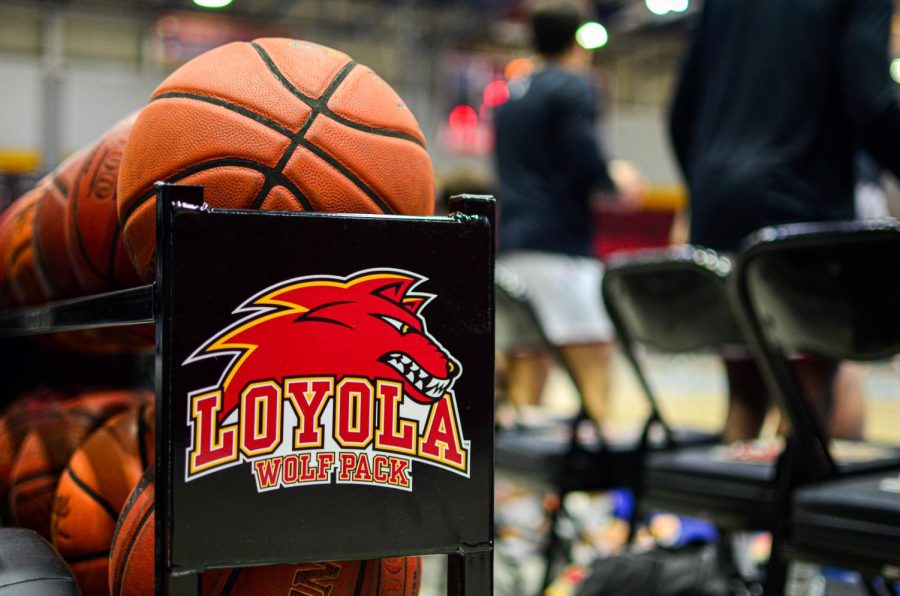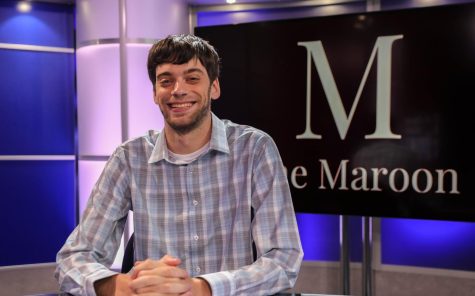History’s Playmaker
Coach Jerry Hernandez speaks on rebuilding 1991 men’s basketball team
A rack of Loyola basketballs sits courtside during the mens’ game against William Carey University on Jan. 22, 2022 in The Den.
February 17, 2022
Jerry Hernandez was hired to coach a men’s basketball team at Loyola that hadn’t existed for 19 years, at a school where 36% of students said they didn’t want athletics, and the only funding for the program came from a small student fee.
He was tasked to build a basketball program from the ground up, but that was 31 years ago, when the Loyola athletics program returned to campus following a student referendum vote in its favor, according to a 1991 issue of The Maroon.
Now, in 2022, the program that Hernandez rebuilt, has allowed for the current men’s basketball team to sit in the No. 1 seat in the National Association Intercollegiate Athletics program earlier this season for the first time in Loyola’s history.
Hernandez coached the men’s basketball team from 1991 to 2004. He has the fourth most wins in school history, with a record of 97 wins and 282 losses. He was hired from St. Martin’s Episcopal School in Metairie, Louisiana and had been coaching for 19 years at various local high schools up to that point.
Hernandez said he took a pay cut to come to coach at Loyola.
“I said ‘man, I’ve got to be crazy, man,’ you know, but it was something that I believed in, Hernandez said. “ I wanted to do it. Evidently, they saw something in me that said, ‘man, this guy’s crazy enough to do this. Now, let’s hire him.’”
His most successful season was the 1994-95 team which returned to the National Association for Intercollegiate Athletics Division II tournament. This was just four years after the program was restarted and on the 50th anniversary of the 1945 National Championship that the men’s basketball program won. The 1994-95 team was inducted into the Wolf Pack Hall of Fame in 2019.
“We had guys that nobody wanted, nobody recruited, and they came in as freshmen and some as sophomores and man, it was magical,” Hernandez said.
Being entirely funded from a portion of Loyola students’ fee, the program had no access to athletic scholarships, which forced Hernandez to recruit based on “the three P’s.”
“Could you pass? And then, could you pay? And then, could you play?” Hernandez said.
Hernandez said sometimes their players would get offers from NCAA Division III schools who could provide their athletes with grants. He couldn’t compete with scholarships and grant money, so his talent pool was more limited than other schools, Hernandez said.
He also said it was rare for Loyola to recruit someone from non-Catholic or private high schools, so he focused mostly on local athletes.
Jarrod Kincaid who played under Hernandez from 1995-1999 was one of the few non-locals, having come from Little Rock, Arkansas. He said Hernandez sought to ease that transition of moving to New Orleans by doing things like taking him to Mardi Gras parades to show him around.
“He was concerned about my education, about me fitting in, about me feeling comfortable coming to a state where I didn’t know anybody and I didn’t know the area, whereas the majority of his players were literally from the city of New Orleans,” Kincaid said. “With Coach Hernandez, obviously, he understood that, and I could tell he had my best interest at heart outside of the basketball.”
Kincaid, who also worked as Hernandez’s assistant coach for a year after he graduated, said Hernandez took on a lot of responsibilities outside the normal requirements of coaching.
“I saw him do everything from setting up the locker room for whatever we were doing, or ordering T-shirts, or taping ankles, driving the bus here or there, picking up food for the team,” Kincaid said. “I mean, he did everything.”
Hernandez said he knew at Loyola that academics were more important than athletics.
“I can tell you that every kid, every guy that came in and finished their eligibility with us, graduated,” Hernandez said. “And that’s one thing that not only I’m proud of, but our kids who were part of this whole building process, that they’re proud of it that they stuck with it.”
After his time at Loyola, Hernandez went back to coaching in the high school ranks. Hernandez retired two-and-a-half years ago after 45 years coaching at both high school and collegiate levels. He recently started giving seminars at schools under his brand, the Sports Education Experience. He’s also written two books, “600+ Little Things that Make a Difference for Boys’ and Girls’ Basketball Coaches” and “The Athletic Trinity,” a book about the relationship between players, coaches, and parents.
Hernandez said he is proud to see the progression of the basketball program over the years, including that it has added athletic scholarships. Kincaid said he was also proud to see where they’ve come.
“I mean, I love it,” Kincaid said. “It makes you smile. I’m 20 plus years removed, but they’ve got better seating in the gym. They’re a national program. They’re beyond a national program.”
Both Hernandez and Kincaid said Stacy Hollowell, current head coach of the men’s basketball team, keeps in touch with them both about the program. Hernandez said he was so happy for what Dr. Michael Giorlando who followed him as head coach from 2004 to 2014 was able to accomplish, and now what Hollowell has been able to accomplish with the team which is currently ranked second nationally.
Kincaid said that Hernandez created the foundation for the basketball program moving forward. Kincaid credited Hernandez with bringing in people of good character and generating positivity in the program, which Kincaid said is “still very much in place.”
Hernandez said he wanted athletes who weren’t afraid to build that foundation, athletes who weren’t “afraid to create history, to create a beginning.”









john watermeier • Feb 22, 2022 at 3:18 pm
played little league with Jerry Hernenadez in the 60,s.
always a class act, played with enthusiasm.
good coach thru the years and all that tutored under him learned a lot.
john watermeier